|
|
|
Sort Order |
|
|
|
Items / Page
|
|
|
|
|
|
|
| Srl | Item |
| 1 |
ID:
097771
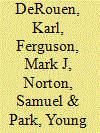

|
|
|
|
|
| Publication |
2010.
|
| Summary/Abstract |
Negotiated civil war terminations differ from their interstate war counterparts in that one side must disarm and cease to exist as a fighting entity. While termination through military victory provides a relatively more enduring peace, many civil wars end with peace agreements signed after negotiations. However, research has shown that the implementation of civil war peace agreements is difficult and prone to collapse. Often these failures are followed by recurrence of the conflict. In some cases, the agreements break down before key provisions are implemented. This article adds to this topic by focusing on the role of state capacity in peace agreement success. We argue that peace agreements and state capacity are necessary but not sufficient conditions for sustainable peace. The article employs a case study approach to explore the importance of state capacity in implementing civil war peace agreements. The role of third-party interventions is also considered. The cases (United Kingdom-Northern Ireland, Indonesia-Aceh, Burundi, Mali, and Somalia) include 14 peace agreements that vary by war type (secessionist or control over government), type of agreement (comprehensive or partial), levels of state capacity (high or low), and peace success (success, partial or failure), and each experienced third-party involvement in the peace process.
|
|
|
|
|
|
|
|
|
|
|
|
|
|
|
|
| 2 |
ID:
097767
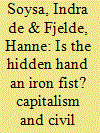

|
|
|
|
|
| Publication |
2010.
|
| Summary/Abstract |
There is surprisingly little empirical scholarship on the spread of capitalistic economic policies under the rubric of 'globalization' and domestic peace. While the classical liberals saw free markets leading to social harmony because of self-interest of individuals, who cooperate for profit, Marxists and others viewed markets as anarchical, requiring state intervention for obtaining justice and peace. The authors argue from an opportunity-cost perspective that the payoffs to rebellion are structured by how an economy is governed. Closed economies are likelier than more open ones to accumulate 'rebellion specific capital' because of high payoffs to organization in the shadows. Using an index of economic freedom that measures how free people are to transact in an economy, the authors find that countries more favorable to free enterprise have a reduced risk of civil war onsets, a result that is robust to the inclusion of institutional quality, per capita wealth, and sundry controls. The results hold up despite a battery of specification changes, alternative data, and testing methods. The findings do not suggest that states under conditions of capitalism lose their autonomy to provide the public good of peace, as skeptics of globalization claim. Peacemakers will do well to build institutions that reward productive investment over rent-seeking, alongside democratic institutions that ultimately gain their legitimacy on the back of good economic performance and well-functioning markets.
|
|
|
|
|
|
|
|
|
|
|
|
|
|
|
|
| 3 |
ID:
097765
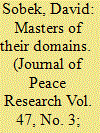

|
|
|
|
|
| Publication |
2010.
|
| Summary/Abstract |
Civil wars are complex events affected by numerous factors. Recent research, however, seems to have concentrated on the rebels and their motivations to the exclusion of how the state can affect the onset and outcome of civil wars. This special issue addresses this lacuna by looking at the role of state capacity. In particular, state capacity is a multi-dimensional concept that encompasses not only the extractive abilities of a state but also economic development and bureaucratic quality. Despite the various ways in which state capacity can be measured, the articles clearly show that strong states have a decreased risk of experiencing a civil war, although there is evidence that civil violence decreases state capacity, implying a reverse causality. In addition, it appears that the capable states that do experience civil violence are more able to credibly commit to a negotiated solution, which increases the possibility of a bargained end to the violence. While these articles do not represent the last word on the subject, they do provide convincing evidence that state capacity plays a critical role in the onset and conduct of civil violence.
|
|
|
|
|
|
|
|
|
|
|
|
|
|
|
|
| 4 |
ID:
097766


|
|
|
|
|
| Publication |
2010.
|
| Summary/Abstract |
This article identifies and addresses key conceptual and measurement issues raised by measures of state capacity in studies of civil conflict. First, it reviews competing definitions and operationalizations of state capacity, focusing specifically on those that emphasize (1) military capacity, (2) bureaucratic administrative capacity, and (3) the quality and coherence of political institutions. Second, it critically assesses these measures on the basis of construct validity, focusing attention on whether they accurately capture the theoretical concept of state capacity, and whether they allow the researcher to differentiate between competing causal mechanisms. Third, it employs principal factor analysis to identify the underlying dimensionality of 15 different operationalizations of state capacity. State capacity is characterized by low dimensionality, with three factors - or dimensions of state capacity - explaining over 90% of the variance in the 15 measures. While the first factor, rational legality, captures bureaucratic and administrative capacity, the second, rentier-autocraticness, and third, neopatrimoniality, capture aspects of state capacity that cut across theoretical categories. The article concludes by suggesting a multivariate approach to modeling state capacity, and that (1) survey measures of bureaucratic quality, and (2) tax capacity are the most theoretically and empirically justified.
|
|
|
|
|
|
|
|
|
|
|
|
|
|
|
|
| 5 |
ID:
097770
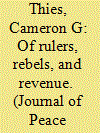

|
|
|
|
|
| Publication |
2010.
|
| Summary/Abstract |
This article investigates the relationship between civil war onset and state capacity through a focus on the role of primary commodities. This is accomplished by moving the focus of the civil war literature away from an almost exclusive concern with the incentives of rebels to a consideration of both rebels and rulers as revenue seeking predators. This predatory theory approach expects that higher levels of state capacity should deter civil war onset, while civil war onset should reduce state capacity. Further, natural resource rents are expected to enhance state capacity, rather than increase the likelihood of civil war onset. In order to deal with the endogeneity posed by including fiscal measures of state capacity in single equation models of civil war onset, this study employs a simultaneous equations framework. This framework allows us to capture the effects of civil war onset on state capacity and vice versa, as well as the effects of primary commodities on both endogenous covariates. The main findings from the statistical analyses include: state capacity does not affect civil war onset, but civil war onset reduces state capacity; and primary products directly affect only state capacity - they do not directly affect civil war onset, as found in previous contributions to the literature.
|
|
|
|
|
|
|
|
|
|
|
|
|
|
|
|
| 6 |
ID:
097768
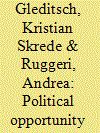

|
|
|
|
|
| Publication |
2010.
|
| Summary/Abstract |
Theories of mobilization suggest that groups are more likely to resort to violence in the presence of political opportunity structures that afford greater prospects for extracting concessions from the government or better opportunities to topple ruling governments. However, existing efforts to consider the possible influences of political opportunity structures on incentives for violence and civil war empirically have almost invariably relied upon measures of democracy to proxy for the hypothesized mechanisms, most notably the argument that the opposing effects of political accommodation and repression will give rise to an inverted U-shaped relationship between democracy and the risk of civil war. The authors detail a number of problems with measures of democracy as proxies for political opportunity structures and develop alternative measures based on the likely risks that political leaders will lose power in irregular challenges and their implications for the incentives for resort to violence. The authors evaluate empirically how the security with which leaders hold office influences the prospects of violent civil conflict. The findings indicate that recent irregular leader entry and transitions indeed increase the risk of conflict onset, while democratic institutions are found to decrease the risk of civil war, after controlling for the new measures of state weakness.
|
|
|
|
|
|
|
|
|
|
|
|
|
|
|
|
| 7 |
ID:
097769


|
|
|
|
|
| Publication |
2010.
|
| Summary/Abstract |
The collapse of Mobutu's Zaire and the arrival of father and son Kabila regimes in the Democratic Republic of the Congo (hereafter, the DRC) were hastened by the dramatic and tumultuous spread of violence from neighboring Rwanda. Mobutu's state's inability to manage the influx of Hutu refugees (with Interahamwe militia members interspersed) into the Kivu province of eastern Zaire from Rwanda's bloody genocide of 1994 or to compensate for the ratcheting up of their cross-border skirmishes with the Banyamulenge (Zairean Tutsi) population in 1996, exacerbated extant tensions and has since resulted in more than a dozen years of civil war. This example prompts us to ask: are countries with higher levels of state capacity better able to resist the spread of violence from neighboring territories into their own? The author argues that when falsely divided notions of spatial heterogeneity and dependence are interacted, contagion from neighboring conflicts becomes a risk of diminishing value for increasingly capable states. A model of civil war contagion affirms a conditional hypothesis, showing that state capacity modifies the likelihood that a state will become infected by a civil conflict occurring in neighboring territories.
|
|
|
|
|
|
|
|
|
|
|
|
|
|
|
|
|
|
|
|
|